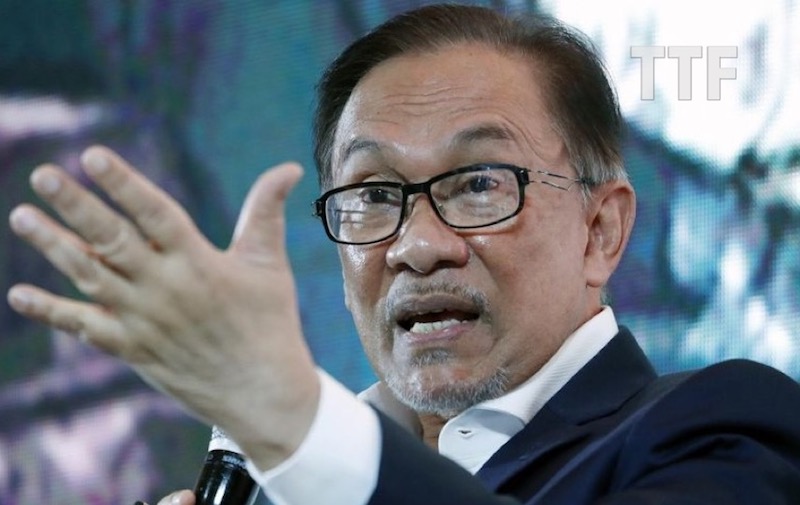
TTF: Dato’ Seri Anwar Ibrahim is seen by many a Muslim as a person who’d go to any length – including use Islam as a weapon – to satisfy his ambition of becoming Prime Minister.
The majority of the Malays no longer view him as a reformist or the “progressive Muslim” he once portrayed himself to be and believe that his premiership ambition is guided by a moral compass that can even point towards the devil as long as it benefits him.
That explains the Nurul Izzah phenomenon.
If Anwar were to have pulled a long face or squealed about PH not having fulfilled its pledges, nobody would have listened, as it is he who brought the predicament onto Malaysians in the first place by teaming up with Mahathir, the man he once opposed.
Lest we forget, in 1998, it was Anwar who accused Mahathir of practicing nepotism and cronyism and bearing the dictatorial traits his daughter now insists is well and alive in PH.
These traits were the basis to the establishment of PKN, and thereafter, PKR, a party that went against Mahathir but somehow allowed him to contest the 14th general election on its platform.
Today, we’re seeing the return of Mahathirism into mainstream politics, the very Mahathirism that Datin Seri Dr Wan Azizah Wan Ismail once told foreign reporters was the reason UMNO needed to be brought down.
Now that the euphoria surrounding Barisan Nasional’s defeat has simmered down, the majority of Malays who supported PKR but feel cheated, are coming to their senses and no longer see Anwar as a reformist.
So, to redeem himself, he got his daughter to play the sympathy card by announcing that she would not contest the general election on account of PH having misled voters by not living up to its promises.
Then, when the time is right, he will begin negotiating the mass exodus of some 30 or 40 Members of Parliament from PH to trigger the collapse of government in hopes that the collapse would buy him time to establish a Third Force.
Basically, what Anwar, Rafizi Ramli and Nurul are trying to do is to establish reformasi 2.0 together with one or two so-called “anti-PH, anti-DAP NGOs” and several low-key political parties – mostly non-Malay – to sweep the country come the 15th general election.
I once warned Umno of a shadow movement that would bring about its downfall during GE14. Umno ignored me and is now paying the price for it.
Don’t ignore me this time around.

KUALA LUMPUR, March 31 — The first year in power for any new government is the most vital as it sets the tone for the administration’s commitment towards political change and reforms, said Nurul Izzah Anwar today.
“We have to understand the first year in any transition of power is a very important year.
“That is the year that we can see their political commitment to make sure changes actually happen,” said the Permatang Pauh MP when asked for her view on the reforms undertaken by the Pakatan Harapan (PH) administration
She was speaking to reporters after the launch of six books published by Angkatan Belia Islam Malaysia (Abim) at the Putra World Trade Centre today.
Among the six included one titled Anwar Ibrahim: Semangat Darah Muda, a memoir of reform aspirations published by Abim in collaboration with Datuk Seri Anwar Ibrahim.
Nurul Izzah and her opinions on reforms have made headlines the past week, after she announced her resignation from all government and political party positions, citing her dissatisfaction at the sluggish pace of reforms as one of her reasons.
Nurul Izzah had said she would also not seek re-election at the next general elections.
She also caused another stir last week when she labelled Prime Minister Tun Dr Mahathir Mohamad a ‘former dictator’ during an interview with a Singaporean daily, later defending her position as saying the moniker given to the nonagenarian was factually correct.
Nurul Izzah today also touched on her fight for prison reforms, saying those within the entire institution, including the incarcerated, wardens, and the labour that goes into maintaining the prisons must always be championed.
She said dialogues between her and the affected agencies had agreed that financial allocation for the prison systems must not be solely to sustain inmates and those working there, but should instead be spent on making the rehabilitation system more effective.
“The agencies have shared their ideas with me that allocations should not be used to sustain more and more inmates in jails.
“It is to make sure the inmates are more effective to be absorbed back into the society and given a second chance in line with their levels of preparations towards rehabilitation,” she said.
She added that the Malaysian Prisons Department was also working behind the scenes and scrambling to achieve their goal of moving as much as 75 per cent of non-violent inmates into community and interactive rehabilitation programmes come 2030.
Adapted from:




